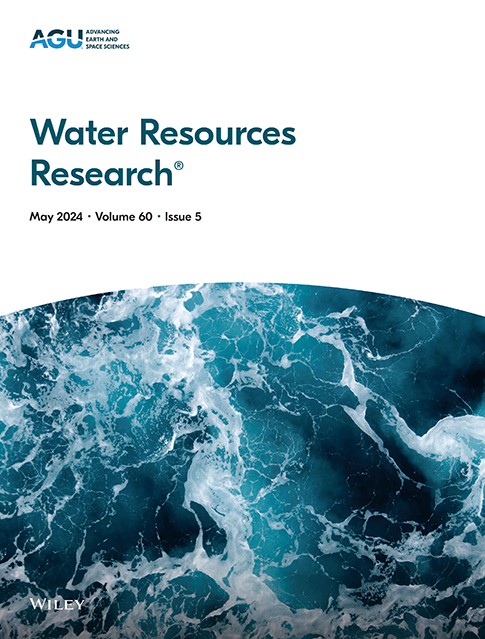Operational Interval Extraction Based on Long-Short Term Memory Networks for Building More Feasible Reservoir Operation Models
IF 4.6
1区 地球科学
Q2 ENVIRONMENTAL SCIENCES
引用次数: 0
Abstract
Advances in data analytics create an opportunity to enhance reservoir operation. A challenge arising is how to utilize operational data to form realistic constraints of the reservoir operation practice. To address this issue, a novel approach is proposed to extract operational intervals of reservoir outflow by a deep learning method, namely the physics-guided long-short term memory network. The knowledge-informed reservoir operation (KIRO) model was built by adding derived operational intervals of outflow as constraints for the traditional reservoir operation (TRO) model. KIRO couples (a) an optimization model to search for optimal operation schemes, and (b) operational intervals of reservoir operators' decisions based on realistic factors. China's Qingjiang cascade reservoir including Shuibuya, Geheyan, and Gaobazhou reservoirs is used as a case study. Results show that KIRO can yield more physically feasible operation schemes than TRO due to its additional constraints. Specifically, KIRO avoids excessive reservoir water level fluctuations and outflow variations compared with TRO. Moreover, the extracted operational interval can help uncover implicit demands of real-world operation, for example, the KIRO model accurately identified the cascade reservoir unit maintenance events from 31 January 2019, to 31 March 2019, and the operation schemes were aligned more closely with the power demands. This study provides a new method for building more feasible reservoir operation models based on deep learning.基于长短期记忆网络的运行区间提取,建立更可行的水库运行模型
数据分析的进步为提高油藏的作业效率创造了机会。如何利用作业数据形成油藏实际作业的现实约束是一个挑战。为了解决这一问题,本文提出了一种新的方法,即物理引导的长短期记忆网络,利用深度学习方法提取水库流出的运行区间。在传统油藏运行模型的基础上,加入推导出的流出期运行区间作为约束,建立了基于知识的油藏运行模型(KIRO)。KIRO结合了(a)一个优化模型来搜索最优的作业方案,(b)基于现实因素的油藏作业者决策的作业区间。以中国清江梯级水库水布垭、隔河岩、高坝洲水库为例进行了研究。结果表明,由于KIRO的附加约束,它比TRO产生了更多物理上可行的操作方案。具体而言,与TRO相比,KIRO避免了水库水位的过度波动和流出量的变化。此外,提取的运行间隔可以帮助揭示实际运行的隐含需求,例如,KIRO模型准确识别了2019年1月31日至2019年3月31日的梯级水库单元维护事件,并且运行方案与电力需求更紧密地一致。该研究为建立更可行的基于深度学习的油藏运行模型提供了一种新的方法。
本文章由计算机程序翻译,如有差异,请以英文原文为准。
求助全文
约1分钟内获得全文
求助全文
来源期刊

Water Resources Research
环境科学-湖沼学
CiteScore
8.80
自引率
13.00%
发文量
599
审稿时长
3.5 months
期刊介绍:
Water Resources Research (WRR) is an interdisciplinary journal that focuses on hydrology and water resources. It publishes original research in the natural and social sciences of water. It emphasizes the role of water in the Earth system, including physical, chemical, biological, and ecological processes in water resources research and management, including social, policy, and public health implications. It encompasses observational, experimental, theoretical, analytical, numerical, and data-driven approaches that advance the science of water and its management. Submissions are evaluated for their novelty, accuracy, significance, and broader implications of the findings.
 求助内容:
求助内容: 应助结果提醒方式:
应助结果提醒方式:


